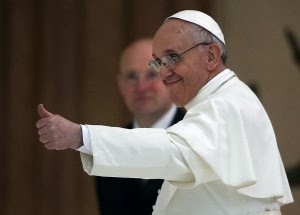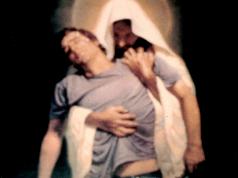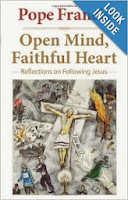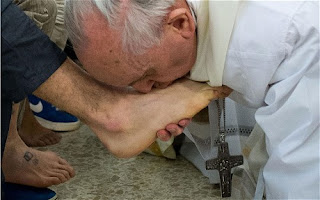[[Dear Sister Laurel, I am not a scholar of Vatican II, but you seem to glow with enthusiasm over the potential for the Church in implementing more of its substance. I was wondering if you could say what else we might expect to evolve from the reforms begun? I would like to catch some of that glow for myself, though Pope Francis has already warmed my heart.]]
Many thanks for your question. It gives me a chance to reflect on precisely why I am so excited about the papacy of Francis and what kind of Church I do hope for precisely because of the reforms of Vatican II and the promise of their continued implementation in the future. We are used to thinking about Vatican II as a past event and already implemented. We celebrate the fiftieth anniversary of the Council this year and in many parishes there have been presentations on the council, on what was achieved and what was left to be achieved. For many attending those presentations what was clear was there was a tremendous excitement in the 60's and 70's, huge idealism and energy for a Church which could be the vehicle for the proclamation of the Gospel to a world truly yearning for it, a Church which really walked with people in their everyday situations and was more than a sacred oasis in the midst of chaotic profanity. However, what was also clear was the disappointment of the past 40 or so years as Vatican II's promise and challenge for reform was countered, eroded away, betrayed, or allowed to wither and die on the vines of either a "hermeneutic of continuity," or a "hermeneutic of rupture."
General Comments on the Ecclesiology of Vatican II:

You see, this Church was the one which took the humanity of Jesus seriously as well as his divinity and learned its lessons from his own accompanying of people, his profound listening to and understanding of them, his teaching in stories which allowed them the privileged space to make a decision for or against him and the Kingdom he proclaimed but who, at the same time therefore continued to teach the unremitting mercy of God who would not relent from loving and calling them all of their lives.
This was the Church whose Lord was the One characterized by kenosis (self-emptying) and asthenia (weakness), the One who died for them while they were YET sinners; for that reason he is the one whose servants, therefore, were characterized by the same things. Note well that there was no denigration of God's greatness in any of this, and no diminishment of Jesus' Lordship. (Some today are complaining that Francis' penchant for dressing simply, wearing no cuff links or a pectoral cross of a base metal, as well as addressing Cardinals while standing on the same level or being seen eating or drinking anything other than the Eucharist "denigrates the papacy" so this is an issue.) Instead it gave us a God and Lord whose authority was shown as countercultural, powerful and creative as love and mercy are always powerful and creative, and compelling precisely because it raised everyone up in the truly humble recognition of their true dignity --- something authority and power in the Constantinian model
never does.
This Church was Catholic in the more Greek sense of the term "katholicos" than the Latin sense of "universalis". What I mean by this is that this Church was catholic in the sense of leaven in bread dough; there is nothing left untouched by its presence, no bits of unleavened bread remaining while the majority of the loaf is leavened. The Latin sense of universalis had more the sense of a gigantic circle into which people were brought; the problem though was that no matter how large one drew or expanded that circle there were always persons that stood outside it, and perhaps, were left to stand outside it because, for whatever reason, they did not hear the Gospel from which it supposedly lived. I am convinced that when Francis spoke recently of the solemn nonsense of proselytizing and distinguished that from evangelizing, coupled with his insistence on a church which is not turned in on itself, he was encouraging us to see and be the church which was truly Catholic in the more Greek sense of the term. It is a Church which knows that with Christ the veil between sacred and profane was definitively rent in two and that there is no place from which the Word of God or its servants cannot and should not go. Christ, after all, descended into hell so that God might be implicated there and transform reality with that presence. The Church must act in no less a Christlike way in her own missionary character.
Finally, therefore, this Church is the Pilgrim People of God. Most fundamentally it is not that there is a Church to which people are then added. Most fundamentally the Church IS the called and assembled People. It has a structure, yes, forms of governance, ways of doing business (many of which may change), and so forth, but it IS the people who are continually called by Christ and for this reason it is always learning and teaching, alway moving forward, always in need of reform, always seeking to respond to and serve its Lord with greater fidelity and sensitivity, always finding ways to be that People from which the entire "sense of the Faith" comes. Another way of saying this is to note that the Church is NOT the Kingdom of God here on earth. The Church is a privileged means towards the Kingdom, a proleptic expression of the Reign of God, but it is NOT the Kingdom. Instead the Church lives from and for the Gospel of God and the Reign it announces. She serves that Gospel and awaits the day when God will truly be all in all --- when there will be a "new heaven and new earth". Again, she is a privileged servant in this but she does not confuse herself with God's reign, nor her servants with Christ himself.
Specific reforms we will see continued or initiated:

At this point I see a few central reforms coming with Pope Francis. The first is the primacy of the Gospel in the life of the Church and therefore in the life of every individual Christian. Vatican II's reception and the liturgical changes made recovered the primacy of the Word of God and there is no doubt that today's Catholics are more steeped in the Scriptures than ever before. But Scripture is a living thing requiring us to grapple with it daily. For many it is much easier to turn to doctrine and dogma as the measure of their lives and "Catholicity." What we see in Francis are clear examples of the Gospel acted out; we see what I wrote about earlier as "enacted parables" which have the power to draw in those who would hear the message being proclaimed. (Some, like the Pharisees in the Gospel a couple of Fridays ago, will see Francis doing good and claim it is by the power of the devil; others will see evil being done. But those with eyes to see will hear the good news of the Kingdom of God in a way they have not been enabled to do before.) Those who live from the power of the Gospel know it is the power to embrace the whole world with God's love and to recognize the hitherto unknown God wherever he is.
The second change stems from this. Without losing our identity as Catholic Christians we will embrace ecumenism more whole-heartedly because our God is bigger than the Church and his presence is found outside her as well. Hebrews speaks of knowing God prior to Christ in fragmentary and partial ways. We will be called to be a Church with the gift of God's definitive revelation in Christ, but without diminishing the truth of God's presence in other faiths or in other forms of Christianity. Ecumenism seems to me to be particularly important in a world where religion is routinely used to divide people. In our own faith we know well that not every difference is significant enough to divide us because we proclaim the same Christ, know the same God in prayer, read the same Scriptures and, with whatever limitations we have, hearken to the same Holy Spirit.
We codified this conclusion in the Joint Declaration on Justification, a document with far-reaching conclusions we should remember in determining what truly divides and what more fundamentally unites denominations. Vatican II taught this and we have a far piece to go before we begin to achieve what it had in mind. I think we will become a Church which more and more truly dialogues with others because that IS the way of evangelization. (Lecturing, apodictic pronouncements are the way of proselytization.) Only in this way will we also be the learning AND teaching Church the world needs us so very badly to truly be. What we cannot be is a Church with nothing to learn nor a Church with nothing to teach. Both of these have been tried and failed. The first corresponds in many ways to those teaching a hermeneutic of continuity (in the sense the SSPX understood this term, for instance), and the second by those embracing the hermeneutic of rupture.

Another change we will see is greater collegiality including deliberative synodality on the part of Bishops. Vatican II allowed for synods of Bishops with deliberative power, but this has never been implemented. Doing so, however will help in our efforts to come to unity with our Eastern brethren for whom a particular model of Petrine ministry is problematical just as it will help us all move from the monarchical model of the Church which gained ascendancy in the Middle ages and was strengthened during the Counter Reformation or Early modern period of Catholicism. From this will also flow a less centralized Church and therefore, one which is more sensitive and responsive to the needs and gifts of local Churches. It will be a Church where the papacy protects unity but does not impose uniformity in its place. This is tremendously challenging but it allows deeper unity and authentic diversity as expressions of unity. It counters papering over profound differences with an externally imposed "Catholic culture" and then being surprised when the fruit rots from within, the souffle deflates at the slightest perturbation, or the whole reality explodes from built up tensions hidden by uniform language, praxis, piety, etc. (You can see why it becomes so important that we truly become a People for whom the Word of God is our lifeblood and the source and measure of all we are and do. It will always be Christ who holds us together despite our differences, nothing less and nothing other.)
Beyond this we will see a Church in which the caste or class system is at least allowed to die away. By this I mean first of all that vocations will not be seen as higher or lower than others. Vatican II leveled a death-blow to this way of perceiving vocations with its teaching on the universal call to holiness but we have not truly accepted its implications. Every person is called to an exhaustive holiness and for that reason, no vocation can be "superior" or "inferior" to another one. Each one will be seen to have different gifts, and need the accompanying and completing gifts of others if the Gospel is to be fully proclaimed in the life of the Church; each one will have different rights and obligations but again, this does NOT mean one is "superior" or "inferior" to another in the way I believe Aquinas' theology has been commonly misinterpreted to mean. My own commitments will witness to celibate love and its importance in the Kingdom, but others' commitments will witness to the place of sexual love in the life of the Church and (as does my own celibate witness) as an icon of the eschatological spousal union with God to which we are all called.
And similarly we will see, I think, a Church in which other forms of that caste system is destroyed. Increasingly we will see a Church which embodies the truth Paul articulated so long ago: [[26 So in Christ Jesus you are all children of God through faith, 27 for all of you who were baptized into Christ have clothed yourselves with Christ. 28 There is neither Jew nor Gentile, neither slave nor free,nor is there male and female, for you are all one in Christ Jesus. 29 If you belong to Christ, then you are Abraham’s seed, and heirs according to the promise.]] At the very least that will mean women in positions of influence and authority and, after some experience of what women bring to such positions and the life of the Church as a whole, a new "theology of women" as Francis has called for. It will mean the laity as such are granted a full place in the life of the church. With marginalized groups of all sorts I think we will increasingly become a Church which sees first of all that they are clothed in Christ and that most fundamentally, there is NO distinction.
Listening to Francis:
There are more specific reforms no doubt; I have not come close to even mentioning the majority of them. What is necessary for all of us I think is to listen to Francis really carefully. When he first began his papacy he began with symbolic acts and folks wondered if substantive change would follow. What we are finding is that those symbolic acts BROUGHT substantive change with them, called for further change, and challenged us each to see the enacted parable for what it was --- a world shaking and breaking language event. Similarly Francis has spoken of really key changes in his two interviews and his homilies. Certain phrases are code words for profound changes in mind and heart which, like yeast in dough, eventually leave nothing untouched or unchanged. Evangelizing vs Proselytizing is one of these. "A Church which risks mistakes rather than being turned in on itself" is another. A Church with a preferential option for the poor and "a poor church" are others. But we must take the time to really penetrate these code words, these bits of leaven, and implement them in whatever ways we personally are called to do.

Sometimes when New Testament scholars think about the importance of certain pieces of the Scriptures they recognize that had a single story been the only one to have survived until today it would have been enough. If Luke's writings, for instance had been lost but his parable of the Prodigal Sons/Prodigal Father survived we would still have Luke's' entire version of the Gospel
in nuce. The Lord's Prayer functions the same way, but for that to be the case we must do more than repeat it unthinkingly. With Francis we have been given a clear charter of the way he desires to lead the Church and the Gospel life he wishes us each to model for others. If he never gave another interview, wrote another encyclical, rode another bus with people he considers his very own, or gave that brilliant smile which screams the joy of a man who knows the mercy of God, we have already been given a clear vision of the courageous and catholic Church VII called for. Vatican II was a beginning. Now we must implement it in the ways Francis is clearly indicating to us. A poor church, a joyful church, a church which lives from and proclaims the mercy of God universally and without qualification --- a truly Catholic Church which will set the world on fire with God's love and make all things new --- that is the vision Vatican II had and which Francis has already made QUITE clear he shares completely.
 The very next day at morning Mass at Casa Santa Marta, Francis preached on Acts 11:1-18, in which Peter tells the church gathered in Jerusalem that Gentiles, too, had come to believe in Jesus. Francis said that Peter had opened the doors to the church for all. "Who are we to close doors?" Francis asked. "In the early church, even today, there is the ministry of the ostiary [usher]. And what did the ostiary do? He opened the door, received the people, and allowed them to pass. But it was never the ministry of the closed door, never."
The very next day at morning Mass at Casa Santa Marta, Francis preached on Acts 11:1-18, in which Peter tells the church gathered in Jerusalem that Gentiles, too, had come to believe in Jesus. Francis said that Peter had opened the doors to the church for all. "Who are we to close doors?" Francis asked. "In the early church, even today, there is the ministry of the ostiary [usher]. And what did the ostiary do? He opened the door, received the people, and allowed them to pass. But it was never the ministry of the closed door, never." Visit our new website, Global Sisters Report! LCWR's work should not be impeded or diminished. It needs to be encouraged and celebrated. We find a painful disconnect between how they are being treated and the church of encounter that you preach. We are knocking, waiting for your response.
Visit our new website, Global Sisters Report! LCWR's work should not be impeded or diminished. It needs to be encouraged and celebrated. We find a painful disconnect between how they are being treated and the church of encounter that you preach. We are knocking, waiting for your response. LCWR does not claim to be perfect. But the "mistakes" they might have made do not come out of a lack of faithfulness. Any mistake would have come out of a dedication to the very faithfulness you articulate in your vision of church: a prophetic vision that makes room for change and is fearless as it moves forward, taking risks on behalf of the needy of the world.
LCWR does not claim to be perfect. But the "mistakes" they might have made do not come out of a lack of faithfulness. Any mistake would have come out of a dedication to the very faithfulness you articulate in your vision of church: a prophetic vision that makes room for change and is fearless as it moves forward, taking risks on behalf of the needy of the world.










































.jpg)
























